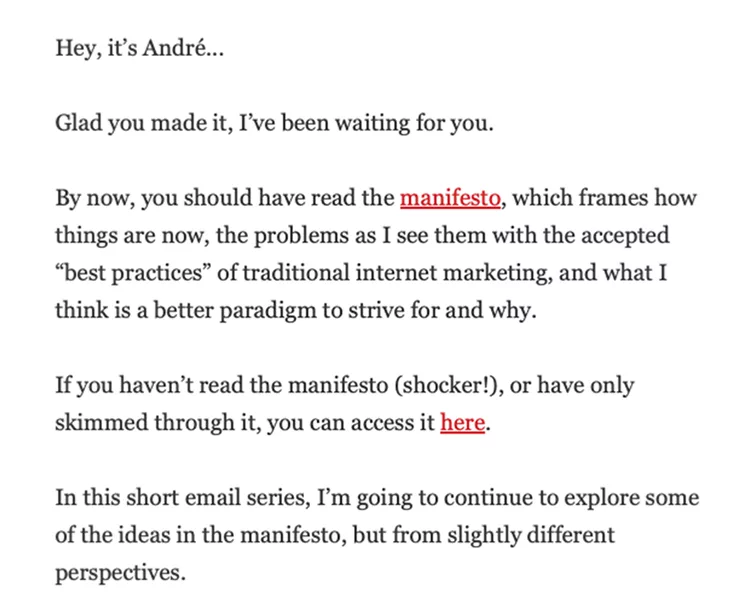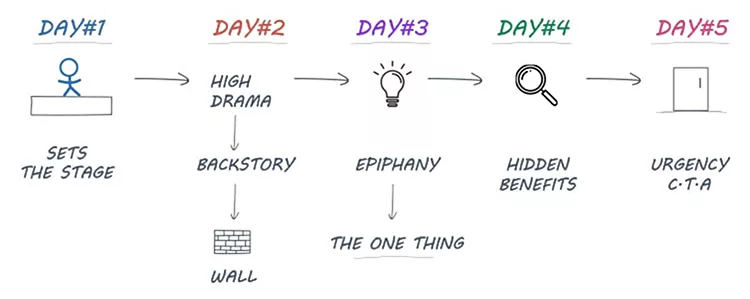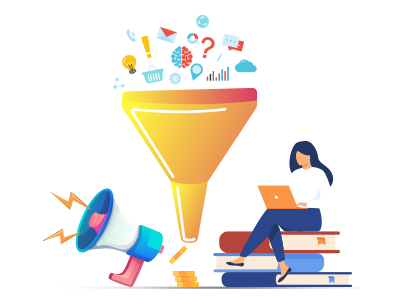Ever launched an amazing product or offer, only to find that people didn’t seem to get the value of it?
You’re not alone.
In fact, even Russell Brunson (co-founder of ClickFunnels) faced the same challenge when he first introduced the sales funnel-building software in 2015.
Russell gave multiple live presentations thinking he had the perfect solution — but no one seemed interested.
No one wanted to even try it out.
That’s when he realized the problem: people didn’t understand what a sales funnel was, why it was better than a traditional website, and why converting more traffic into leads or sales was critical to their success.
So he pivoted his presentation to teaching the audience about funnels.
The result?
It’s now a famous story that, at his very next presentation, Russell closed over half the room. That same pitch helped ClickFunnels bring in $14 million in their first year during 70-80 live events and webinars.
This story is one of the inspirations behind a powerful new way of marketing called the microlearning marketing funnel.
In this blog post, we’ll explain exactly what that is, and how you can build one into your business.
What is a Microlearning Marketing Funnel?
A microlearning marketing funnel is a strategic approach that integrates bite-sized, focused learning content into the customer journey.
The aim is to nurture leads, educate prospects, and establish you or your product as an authority.
Microlearning, by definition, involves delivering easily digestible pieces of information designed to be consumed quickly. The content is typically short-form – whether a short video course, an email series, a short. pdf, an interactive quiz, or similar.
The content is usually delivered through automation.
And what about the funnel part?
When applied to marketing funnels, the goal of a microlearning marketing funnel is to convert potential customers more effectively.
The strategy is particularly useful for businesses that don’t have a large following. Or that they have a new or complex product that customers need to understand before purchasing.
5 Key Elements of a Microlearning Marketing Funnel
A microlearning marketing funnel turns the traditional funnel into a dynamic learning experience.
By feeding targeted pieces of content at different stages of the funnel, businesses can improve engagement and better guide potential customers toward a purchasing decision.
Some of the key elements of a microlearning marketing funnel include:
- Short, Focused Content: Each stage of the funnel uses brief but valuable content (e.g., a 2-minute video, a quick guide, an infographic, or an email) to provide actionable information or educate the reader about their current problems. This allows users to engage without feeling overwhelmed by long-form content, and usually without committing to making a purchase yet.
- Step-by-Step Learning: As leads progress through the funnel, they consume increasingly detailed content that builds on previous learning. For instance, a top-of-funnel piece might introduce a problem or concept, while mid-funnel content provides strategies to solve it, and bottom-funnel content explains why your product or service is the ultimate solution.
- Engagement Triggers: Microlearning keeps users engaged through frequent interactions. By offering small but compelling pieces of content, the aim is to keep leads engaged as they move down the funnel. Eventually, you should see better conversion rates.
- Personalization & Automation: Using a platform like ClickFunnels, businesses can automate the delivery of microlearning content tailored to each prospect’s stage in the buyer’s journey. This makes the experience more personalized, improving engagement and increasing the chances of conversion.
- Educational Value: Instead of purely promoting products, microlearning funnels focus on educating the audience. This positions your business as a trusted resource. Even if you’re selling a similar product or service as your competitors, a customer will be more likely to choose you as they trust you or see you as an expert.
A Microlearning Marketing Funnel in Action

One of the most widely used tactics from Russell Brunson’s book DotCom Secrets is the Soap Opera Sequence (SOS).
The SOS is an email nurturing sequence.
It was developed by one of the top email marketers in the industry, André Chaperon. The sequence is usually a 5-day email automation that educates readers, tells your story, and leads to a conversion on the final day.
It’s a great strategy for a microlearning marketing funnel.
And that’s exactly what André did next.
André’s current business teaches online course creators and marketers how to create a ‘Tiny Digital World’. As it’s a new concept, Andre created a 7-step email nurture sequence that goes through step-by-step where the idea comes from, who it’s useful for, and how to learn more.
Let’s break down the 7-step microlearning marketing funnel:
- Tiny Worlds: A New Frontier (email 1 of 7): In the first step of the funnel, André asks the reader to question their ideas about what marketing is. He says there’s a new opportunity for online marketers: creating a Tiny World.
- Tiny Worlds: From Nothing (email 2 of 7): In the second email, André introduces the concept that ‘The Internet is like Tokyo’. This means that if enough people are on the Internet, you can make a healthy income by specializing in a niche.
- Tiny Worlds: Open vs. Closed (email 3 of 7): Next, André explains the downsides of a traditional marketing funnel: there are too many opportunities to “lose” a buyer. Instead, there’s a better way to market to people online.
- Tiny Worlds: Upstream vs. Downstream (email 4 of 7): André explains more downsides of a traditional marketing funnel: if you’re depending on one traffic source, when that slows down your business dies. Again, there’s a better way to market to people online. And you can do this when you stop optimizing for ‘sales’ and start optimizing for ‘happy’ customers.
- Tiny Worlds: Wayfinding (email 5 of 7): André now introduces a new kind of marketing funnel: one that is ‘choose your own adventure’. He explains that a ‘Tiny World’ is the way to build this new kind of marketing funnel.
- Tiny Worlds: 2 + 2 (email 6 of 7): He now introduces more of the Tiny World concept. It’s about offering potential customers different exciting paths to travel down – so they can go after the knowledge or materials they want. Some people who are ready to buy will buy, but others may need to consume more high-value content and spend time in the ‘open world’ funnel before buying.
- Tiny Worlds: Next (email 7 of 7): In the final email, André presents his paid email membership to help marketers and online creators using Tiny Digital World to build better funnels and better communities online.
André’s email series takes 7 days to finish.
The emails are packed with quotes, theories on marketing and philosophy, and even links to other books or articles.
It might not be for everyone.
But the person who is very interested in learning more, they are far more likely to take up the paid subscription after going through this microlearning marketing funnel.
10 Ideas to Implement a Microlearning Marketing Funnel in Your Business
A microlearning marketing funnel is about gradually educating your audience with digestible pieces of content.
By delivering value over time, you build trust, establish authority, and position your offer as the logical solution to their problem.
Here are 10 ways you can think of implementing this strategy into your online business:
- Online Course Creator (7-Day Email Series): Create a 7-part email series where each day introduces a key concept in your course, building excitement and knowledge step by step until the final email offers the full course.
- E-commerce Store (Product Education Video Series): Develop a short video series where each video teaches customers how to use different features of your products, progressively increasing their desire to purchase by the final video.
- Coaching Business (Webinar + Follow-Up Emails): Host a free webinar where you explain a core problem and solution in your coaching niche. Then follow up with a microlearning email series that dives deeper into the strategy you presented, leading to a paid offer.
- SaaS Business (Interactive Product Demos): Offer potential customers access to a free demo of your software, and follow up with a daily email that teaches them one key feature or benefit per day, guiding them toward upgrading to the full version.
- Affiliate Marketing (Email Course + Free Guide): Create a 5-day email course that educates readers on how to get started with affiliate marketing, with each email delivering bite-sized tips. Offer a free guide on day 5, and use that moment to introduce your paid affiliate marketing system.
- Fitness Business (Challenge Series via SMS): Run a 7-day fitness challenge via SMS where each day provides a quick workout tip or mini-lesson. At the end of the challenge, introduce your premium fitness coaching program.
- Digital Marketing Agency (Micro-Webinars): Offer a series of micro-webinars, each 10 minutes long, where you teach a crucial aspect of digital marketing. Follow up with quick-reference guides and emails that lead into your higher-end consulting services.
- Consultancy Firm (PDF + Daily Tips Email): Offer a free downloadable PDF with a blueprint for solving a specific business challenge, followed by a series of daily tips or lessons via email that build on the strategies outlined in the PDF.
- E-learning Platform (Drip-Feed Video Tutorials): Provide a free drip-feed of video tutorials over the course of a week that teach foundational skills, leading up to an offer for your full course or membership platform.
- Agency for Local Businesses (Local SEO Mini-Course): Offer a free 3-day mini-course on local SEO via email. Each day, explain a different tactic for ranking higher on Google and then pitch your done-for-you SEO services on the final day.

How Will You Build Your Microlearning Marketing Funnel?
By now, hopefully probably excited about the idea of a microlearning marketing funnel.
But you might also be wondering: “How do I actually implement this without spending too much time or money?”
You’re not alone!
Many business owners feel overwhelmed by the thought of building a new funnel, especially when time is precious.
The good news is that ClickFunnels makes it simple.
With plug-and-play templates, you can quickly customize a microlearning funnel to fit your business needs, without the hassle of starting from scratch.
Below are some templates that match up with the ideas we covered earlier:
- Email Series Funnel (Coaching Business): Use the Soap Opera Sequence Template to create a 5-7 day email series, where each email provides actionable tips, gradually leading prospects toward booking a coaching session or enrolling in a course.
- Video Sales Funnel (E-commerce Store): Implement a Video Sales Letter Funnel to create a series of short videos demonstrating the benefits of your product. Each video can educate and build trust, encouraging the prospect to make a purchase by the final video.
- Webinar Funnel (Consultancy): The Webinar Funnel Template is perfect for hosting a live or automated webinar, followed by emails that nurture the lead with additional learning content. It’s an ideal way to establish authority before making a high-ticket offer.
- Challenge Funnel (Fitness Business): Use the Challenge Funnel Template to deliver a 5-day fitness challenge. Each day’s content is delivered via email or SMS, providing actionable steps, with a final offer to enroll in your fitness program.
- Membership Funnel (SaaS or Digital Course Business): Build a membership site using the Membership Funnel Template that drip-feeds content, such as video tutorials or downloadable guides, giving users valuable information and leading them to upgrade to premium services or full courses.
With ClickFunnels, you don’t need to reinvent the wheel.
Just choose a template that suits your business and start guiding your prospects through an engaging, educational journey.
Final Thoughts
Building a microlearning marketing funnel can transform the way you engage with your audience.
It helps you educate and nurture leads in a way that builds trust and authority.
By delivering bite-sized content, you guide your prospects step by step toward understanding your product’s value and making an informed purchase decision.
And the best part?
ClickFunnels makes it easy.
With a variety of plug-and-play templates designed for businesses like yours, you can implement a microlearning funnel without wasting time or resources.
Whether you’re creating a coaching program, selling digital products, or offering consulting services, there’s a template to fit your needs.
Now it’s time to put what you’ve learned into action.
Start educating your audience, build that essential trust, and watch your conversions soar with the power of microlearning marketing funnels!






i WANT TO CHICK MY ACCOUNT BECAUSE i THINK YOU ARE OVER CHARGING ME. YOU CHARGE ME $97 A MONTH jUDY.
great love to read this blog all information helpful and comprehensive thanks
superb article love to read this your informative article keep it up thank you
very informative
Got the points. Nice article
68% of B2B companies have not identified their marketing funnel.